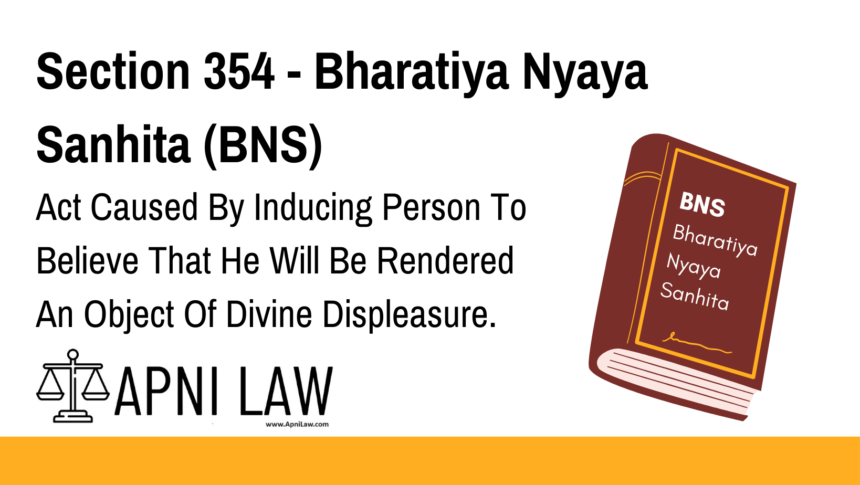Code: Section 354 BNS
Whoever voluntarily causes or attempts to cause any person to do anything
which that person is not legally bound to do, or to omit to do anything which he is legally
entitled to do, by inducing or attempting to induce that person to believe that he or any
person in whom he is interested will become or will be rendered by some act of the offender
an object of Divine displeasure if he does not do the thing which it is the object of the
offender to cause him to do, or if he does the thing which it is the object of the offender to
cause him to omit, shall be punished with imprisonment of either description for a term which
may extend to one year, or with fine, or with both.
Illustrations.
(a) A sits dharna at Z’s door with the intention of causing it to be believed that, by so
sitting, he renders Z an object of Divine displeasure. A has committed the offence defined in
this section.
(b) A threatens Z that, unless Z performs a certain act, A will kill one of A’s own
children, under such circumstances that the killing would be believed to render Z an object
of Divine displeasure. A has committed the offence defined in this section.
Explanation of Section 354 BNS
Section 354 of the Bharatiya Nyaya Sanhita (BNS) addresses acts where individuals are coerced or manipulated into performing actions (or omitting them) based on the false belief that such actions will affect their spiritual or moral standing—specifically, by making them the object of Divine displeasure.
This provision aims to prevent the exploitation of people’s religious sentiments and beliefs for personal gain or to exert undue influence.
Key Provisions of Section 354:
- Prohibition of Coercion Through Divine Threats: It is an offense to induce someone to act against their legal rights or obligations by exploiting their fear of divine wrath.
- Punishment: The offender may face imprisonment for up to one year, a fine, or both.
- Applicability: Applies to both direct and indirect forms of coercion, including threats or manipulative acts based on religious beliefs.
Illustration
Example 1: Dharna to Induce Divine Displeasure
A sits in front of Z’s house in a dharna, claiming that this act will cause Z to be the object of divine displeasure unless Z fulfills a specific demand. This act is an offense under Section 354.
Example 2: Threat of Divine Displeasure Through Personal Sacrifice
A threatens Z, stating that if Z does not perform a specific act, A will kill one of their own children. The threat is presented in such a way that Z believes the act of killing would invoke divine displeasure upon them. This scenario qualifies as an offense under Section 354.
Common Questions and Answers on Section 354 BNS
1. What does Section 354 prohibit?
- Answer: It prohibits inducing someone to do something against their will or legal right by manipulating their belief that not doing so will result in divine displeasure.
2. Can this section apply to verbal threats or only written threats?
- Answer: Yes, it applies to both verbal and written threats, as well as any act that creates such a belief, regardless of the medium.
3. What is the punishment for violating Section 354?
- Answer: The offender can be punished with imprisonment up to one year, a fine, or both.
4. Does this section apply to religious leaders or individuals in positions of influence?
- Answer: Yes, anyone, including religious leaders, can be held accountable under this section if they exploit religious beliefs to manipulate others.
5. Are there any exceptions under this section?
- Answer: The section does not provide specific exceptions, but genuine religious practices or teachings that do not involve coercion or manipulation are not covered under this provision.
Conclusion
Section 354 of the Bharatiya Nyaya Sanhita (BNS) serves as a legal safeguard against the exploitation of religious sentiments. It ensures that individuals are not manipulated or coerced into actions based on false claims of divine displeasure, protecting both personal freedom and the integrity of religious beliefs.








